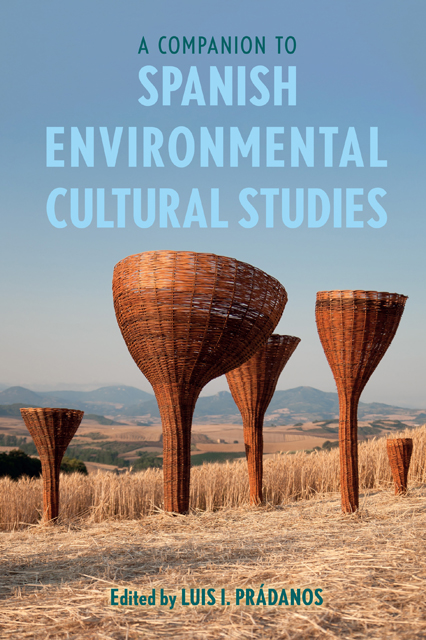Book contents
- Frontmatter
- Contents
- List of Illustrations
- List of Contributors
- Note on the Translations
- Acknowledgements
- Introduction: Spanish Environmental Cultural Studies
- Part I Environmental Cultural History and Political Ecology
- Part II Water and Power
- Part III Ecologies of Memory and Extractivism
- Part IV Animal Studies and Multispecies Ethnographies
- Part V Food Studies and Exploitative Ecologies
- Part VI Ecofeminism
- Part VII (Neo)Colonial and Racialized Ecologies
- Part VIII Tourism and the Environmental Imagination
- Part IX Eco-Mediation and Representation
- Part X Trash and Discard Studies
- Bibliography
- Index
19 - The Gaze on the Tourist: Critical Approaches in Spanish Environmental Humanities
Published online by Cambridge University Press: 08 June 2023
- Frontmatter
- Contents
- List of Illustrations
- List of Contributors
- Note on the Translations
- Acknowledgements
- Introduction: Spanish Environmental Cultural Studies
- Part I Environmental Cultural History and Political Ecology
- Part II Water and Power
- Part III Ecologies of Memory and Extractivism
- Part IV Animal Studies and Multispecies Ethnographies
- Part V Food Studies and Exploitative Ecologies
- Part VI Ecofeminism
- Part VII (Neo)Colonial and Racialized Ecologies
- Part VIII Tourism and the Environmental Imagination
- Part IX Eco-Mediation and Representation
- Part X Trash and Discard Studies
- Bibliography
- Index
Summary
The day after a volcano began erupting in Cumbre Vieja, on the island of La Palma, the Minister of Industry, Trade, and Tourism of the Spanish government, Reyes Maroto, reacted by launching a comforting message to the tourism sector: “We will provide all the information so that the island will become an attraction for tourists who want to enjoy this magnificent display of nature safely.” On the one hand, her message reached out to tourists “so that they know this island is open to them,” and on the other hand, it targeted the business sector to enable “volcano tourism” to become “a strength,” “an attraction for many tourists who wish to enjoy what nature has given La Palma.” Maroto immediately had to clarify her statements and insist that, first of all, her main concern was the victims of the volcano, the thousands of people who had lost their homes and businesses, and the fact that the lava had practically divided the island in two.
La Palma is located in the Canary Islands and, along with the Balearic Islands, it is the region in Spain with the greatest economic dependence on tourism, accounting for approximately 40 percent of the economy in terms of regional income and direct employment. For decades, tourism has also been a predominant sector along the entire eastern Mediterranean coast of Spain and, owing to the recent airbnbification process, has spread to many cities, including the largest ones, Madrid and Barcelona. As a whole, tourism accounts for nearly 14 percent of the country’s GDP, not including the underground economy. However, the Minister’s statements reveal a deeper and more pervasive aspect of tourism in Spain than shown by the macroeconomic indicators, a hegemonic imaginary: everything is a potential tourist commodity and it is irrational not to make the best possible touristic use of any tangible or intangible assets that can be sold as such. From the tourism promotion campaigns under the Franco regime in the 1950s, to the recent announcements to “put to work” empty rooms or second homes for tourist rental purposes, the touristic rationale has not only spread in all directions, but has seeped into common sense to the point of making the touristifying gaze normal.
- Type
- Chapter
- Information
- A Companion to Spanish Environmental Cultural Studies , pp. 206 - 212Publisher: Boydell & BrewerPrint publication year: 2023



